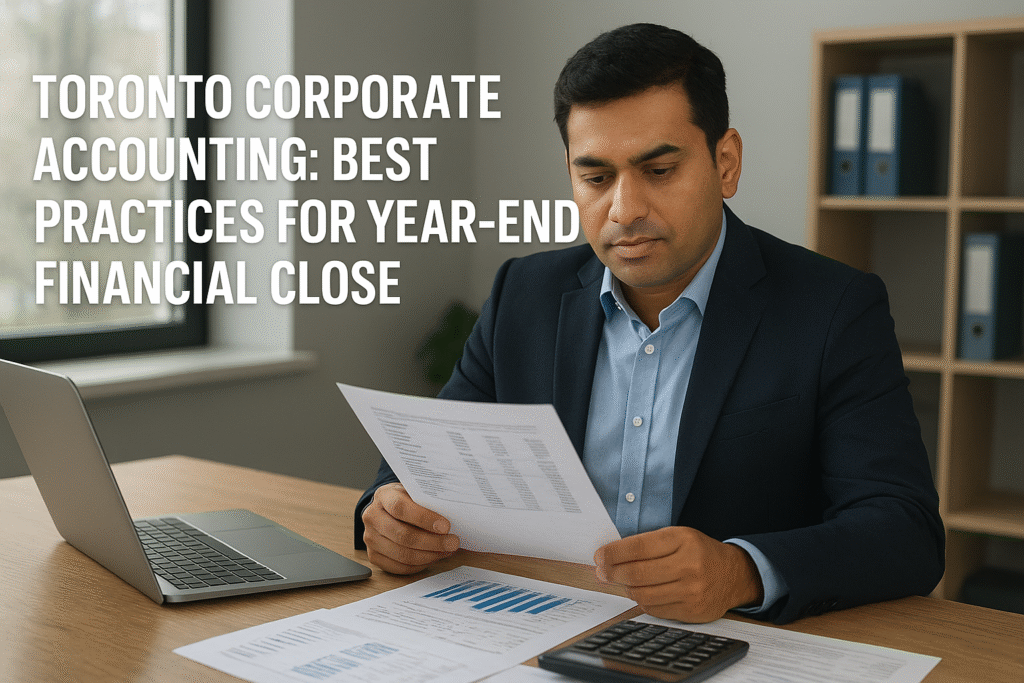Toronto Corporate Accounting: Best Practices for Year-End Financial Close
For companies of all sizes, wrapping up the fiscal year can be complex and time-consuming. From reconciling accounts to complying with accounting standards, a structured approach is essential. Working with an experienced corporate accountant at Gondaliya CPA, Toronto businesses can navigate this process efficiently. This guide outlines best practices for year-end financial close, helping companies streamline accounting procedures, avoid costly mistakes, and position themselves for growth in the year ahead.
Request a Free Consultation
Why Year-End Financial Close Matters for Businesses

A proper year-end financial close is more than a regulatory formality—it’s an opportunity for businesses to assess financial health, make informed decisions, and present accurate information to stakeholders.
Regulatory Compliance
Companies in Toronto must follow Canadian accounting standards, including IFRS or ASPE. A timely and accurate close ensures your business remains compliant and avoids penalties.
Stakeholder Confidence
Investors, lenders, and board members rely on accurate financial statements. A thorough year-end process builds trust and reinforces credibility.
Tax Planning
Year-end data helps optimize corporate taxes. Accurate financial records allow your business to identify deductions, plan for tax payments, and reduce risks.
Strategic Planning
Financial insights at year-end reveal profitability trends, cost control, and operational efficiency, enabling smarter decisions for the upcoming year.
Audit Readiness
A well-organized close ensures your business is prepared for external audits, reducing disruptions and minimizing unexpected adjustments. Partnering with professionals experienced in Canada accounting standards can make this process even smoother and fully compliant.
Key Steps for a Smooth Year-End Close
A structured approach can make the year-end close simpler and more efficient for your business:
1. Review and Reconcile Accounts
Ensure all accounts reflect the true financial position:
- Bank Accounts: Compare bank statements with internal records.
- Accounts Receivable & Payable: Verify invoices and overdue accounts.
- Inventory: Conduct physical counts and adjust for obsolete or damaged items.
2. Manage Accruals and Adjusting Entries
Record revenues and expenses in the period they occur to avoid misstatements. Include prepayments, unearned revenues, and other deferred items.
3. Review Assets and Liabilities
- Assets: Confirm purchases, disposals, and depreciation are correctly recorded.
- Liabilities: Verify loans, taxes, and contingent obligations to prevent surprises.
4. Evaluate Equity Accounts
Ensure shareholder transactions, dividends, and retained earnings are accurate, supporting transparency and informed decision-making.
Best Practices for Businesses
Even if you don’t manage accounting directly, you can improve efficiency and accuracy by implementing these practices:
Plan Ahead with a Year-End Calendar
Set deadlines for reconciliations, internal reporting, audit preparation, and financial statement finalization.
Leverage Technology
Use cloud-based accounting software and automated reconciliation tools to reduce errors and save time.
Collaborate Across Departments
Finance interacts with operations, HR, and legal to ensure all relevant data is captured.
Conduct Pre-Close Reviews
Identify incomplete or incorrect transactions early to prevent delays.
Review Financial Statements Thoroughly
Compare results with prior periods, check key metrics, and ensure reporting aligns with business objectives.
Prepare for External Audit
Organize documentation, maintain clear audit trails, and address potential issues proactively.
Post-Close Analysis
Review lessons learned, update processes, and implement improvements for next year.
Common Year-End Challenges
Businesses often face hurdles such as:
- Missing or late data from vendors or departments
- Manual errors due to outdated processes
- Complex accounting standards
- Resource constraints during busy periods
- Adjustments suggested by external auditors
Proactive planning, early data collection, and leveraging technology can help overcome these challenges.
Tax Considerations
Year-end is also the ideal time for strategic tax planning:
- Ensure proper recording of deferred taxes and provisions
- Identify eligible credits and incentives
- Review intercompany transactions for tax compliance
A well-executed close minimizes tax liability while maintaining regulatory compliance.
How Gondaliya CPA Supports Toronto Businesses

At Gondaliya CPA, we specialize in corporate accounting for businesses, not just accountants. Our services help companies:
- Streamline year-end financial close procedures
- Ensure compliance with Canadian accounting standards
- Optimize tax strategies
- Prepare accurate and timely financial statements
- Provide actionable insights for strategic growth
Partnering with us reduces year-end stress, improves reporting accuracy, and gives you more time to focus on growing your business.
Year-end financial close is a critical milestone for any Toronto-based company. By following best practices, leveraging technology, and fostering cross-department collaboration, your business can achieve an efficient, accurate, and compliant close.
Frequently asked questions
1. What does a corporate accountant do during year-end financial close?
A corporate accountant handles key tasks such as reconciling accounts, reviewing financial statements, ensuring compliance with Canadian accounting standards, and preparing tax filings. Their goal is to provide accurate, timely data so business leaders can make informed decisions.
2. Why is year-end financial close important for Toronto businesses?
Year-end financial close is essential for assessing performance, meeting tax obligations, and preparing for audits. It gives business owners a clear financial picture and helps them plan strategically for the upcoming year.
3. How can hiring a corporate accountant in Toronto help my business?
Working with an experienced corporate accountant in Toronto ensures your financial records are accurate, compliant, and strategically aligned. They can also identify opportunities for cost savings, tax planning, and improved cash flow.
4. What are common challenges during the year-end close process?
Common challenges include unreconciled accounts, missing invoices, late expense reporting, and regulatory compliance issues. A skilled corporate accountant can help anticipate and resolve these challenges efficiently.
5. When should I start preparing for the year-end close?
Ideally, preparation for year-end close should begin several months in advance. Regular monthly or quarterly reviews with your corporate accountant make the year-end process smoother and more accurate.
6. Does Gondaliya CPA offer support for year-end financial close?
Yes. Gondaliya CPA specializes in Toronto corporate accounting and year-end financial close. Our team of experienced corporate accountants provides guidance, financial reviews, and reporting to ensure compliance and support your business goals.
Key Points on Toronto Corporate Accounting: Best Practices for Year-End Financial Close
- Start preparing for year-end well in advance to ensure a smooth financial close process.
- Reconcile all bank accounts, credit cards, and loan accounts to verify accuracy of transactions.
- Review accounts receivable and accounts payable to identify outstanding invoices or overdue payments.
- Verify all accruals and prepayments are recorded correctly to reflect the true financial position.
- Ensure all fixed assets and depreciation are updated and accurately reflected in the books.
- Conduct inventory counts and adjustments to reconcile physical stock with accounting records.
- Review payroll records to ensure all employee wages, benefits, and deductions are accurately accounted for.
- Assess provisions for taxes, including corporate income tax, GST/HST, and payroll-related taxes.
- Close temporary accounts, such as revenue and expense accounts, to prepare for the new fiscal year.
- Prepare detailed financial statements including balance sheet, income statement, and cash flow statement.
- Identify and address any discrepancies or unusual transactions before finalizing the books.
- Work with your CPA to ensure compliance with federal and provincial accounting standards.
- Document all adjustments and reconciliations for audit readiness and future reference.
- Evaluate financial performance against budgets and prior-year results to identify trends and areas for improvement.
- Establish a checklist and timeline for year-end close to streamline the process in future years.
Whether your business is small or large, applying these best practices and working with an experienced accounting team ensures a smoother financial close, reliable reporting, and a strong foundation for growth. Contact Gondaliya CPA today to learn how we can support your next year-end financial close.

Sharad Gondaliya is a CPA Canada & CPA USA with 14 Years+ experience of Accounting, Tax, Payroll of Corporate Small Businesses as Tax Accountant. He is fully certified CPA Ontario and CPA USA and is well known among corporate small businesses for tax planning, efficient tax solutions, and affordable CPA services. Sharad is the Principal (Director) of Gondaliya CPA – Affordable CPA Firm in Canada. Licenses: CPA Ontario: 61040184 | CPA USA (MT): PAC-CPAP-LIC-033176 | CPA USA (WA): 57629 | CPA Firm License: 61330051 View Full Author Bio
